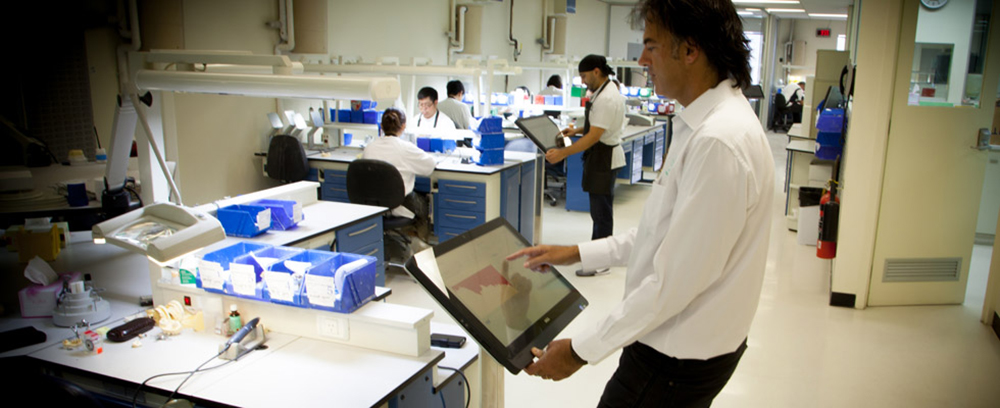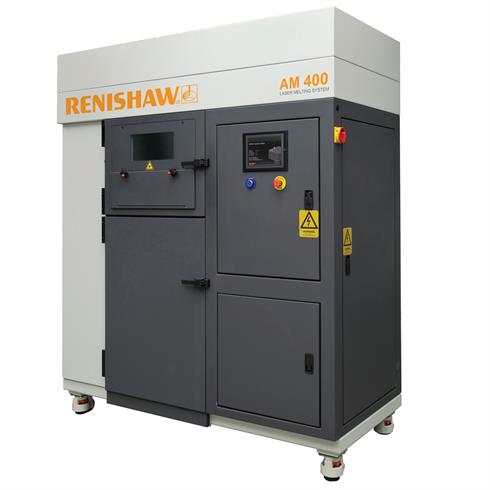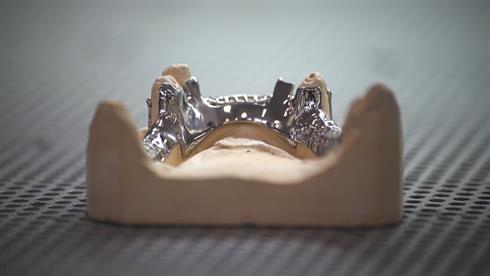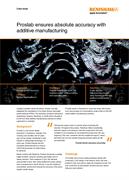Cette page n'est pas disponible actuellement dans votre langue. Vous pouvez en afficher une traduction automatique avec l'outil Google Translate. Cependant nous déclinons toute responsabilité quant à ce service et nous ne contrôlons pas les résultats de la traduction.
Pour en savoir plus à ce sujet, contactez-nous.
Proslab ensures absolute accuracy with additive manufacturing
Background
Proslab is a full service dental laboratory in Canterbury, Australia. The company was founded over 30 years ago and has always maintained a keen interest in cutting-edge technology. 15 years ago, Proslab became the first Australian dental laboratory to bring in CAD/CAM processes for metal frames for dentures.
Before working with Renishaw, Proslab introduced a partially digital workflow, using 3D scanning and design tools to design dentures.
Once designed in CAD, the dentures were printed in resin, then using traditional lost-wax casting were manufactured in cobalt chrome. It was this traditional, uncontrolled, process that reduced the accuracy of the parts, despite careful design.
Proslab turned to Renishaw to overcome issues with human error and accuracy by incorporating a state-of-the art AM 400 metal additive manufacturing machine.
Training and support were our priority when purchasing the machine. Throughout the process, Renishaw offered outstanding technical support and training to meet this requirement. We were confident in our investment as we trusted the product from the very beginning. This trust, combined with the exceptional support, meant that there was not one moment during the process where we felt uncomfortable.
Proslab Dental Laboratory (Australia)

Proslab Dental Laboratory, Canterbury, Australia
Challenge
During the process, accuracy can be reduced by dimensional changes as a result of uncontrolled heating and cooling, varied cross-sections and incomplete casting or gas porosity.
“Achieving a high level of accuracy with lost-wax casting is difficult,” explained Damian Synefias, CEO of Proslab. “This means frameworks often need to be reworked after being sent to the dentist and fitted to a patient.”
The most accurate method on the market to manufacture removable partial dentures is additive manufacturing. However, incorporating this technique involved significant change to the company's internal processes and business model.
Solution
“To demonstrate the accuracy of the process, Renishaw manufactured sample parts at its Healthcare Centre of Excellence in Miskin, near Cardiff, UK,” explained Alex Harris, Applications Engineer at Renishaw. “Our dental production facility runs daily, so there was extensive data to prove that additive manufacturing was a viable if not ideal solution.”
Impressed by the quality of the sample parts, Proslab purchased Renishaw's AM 400 metal additive manufacturing system. The machine enables the production of removable partial dentures directly from a CAD file, eliminating the additional casting step. Frameworks are built in 40-micron layers of CE marked cobalt chrome powder and built by laser powder bed fusion (PBF), using a high-powered ytterbium fibre laser.
“Training and support was our priority when purchasing the machine,” explained Synefias. “Throughout the process, Renishaw offered outstanding technical support and training to meet this requirement. We were confident in our investment as we trusted the product from the very beginning. This trust, combined with the exceptional support, meant that there was not one moment during the process where we felt uncomfortable.”
Results
“Proslab is now able to produce the most accurate frameworks possible,” continued Synefias. “Directly printing from a CAD file means we have reduced the number of in-house remakes due to error by 100 per cent. If any error were to occur, we'd quickly be able to identify the source and amend it.”
Because of the improvement in accuracy that the AM 400 offers, Proslab can now ensure each framework is a perfect fit for the patient. This helps to improve a prosthetist's service and reputation, benefits patients by offering improved fit and removes any delays that may occur if the framework is not right first time.
“The frameworks we produce are now guaranteed to fit every time, which means we have been able to raise turnover,” said Synefias. “The difference in fit has been amazing – we are now gaining more customers for it as we can ensure that customers will receive the best possible fitted dentures.
“By cutting out the casting step, we can now produce removable partial dentures in half the time,” continued Synefias. “We save an entire day of processing, which means we have been able to upskill our casting staff into manufacturing roles. Staff have responded well to the new format and we've had a significant boost in morale, as they have the peace of mind that parts will be correct.
“Proslab is the first Australian dental laboratory to incorporate additive manufacturing, and we now have access to the most up to date technology in the world,” added Synefias. “We have also improved turnaround times to a five-day cycle, improving the service to our clients.
“We required a high level of support and the service we received has been excellent and, in my opinion, Renishaw has been perfect. The project has been such a success that we plan to purchase another machine,” concluded Synefias.

 Above: Polished RPD on stone model
Above: Polished RPD on stone model
